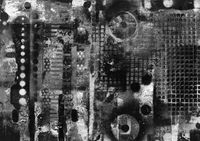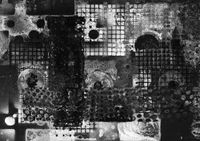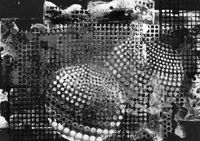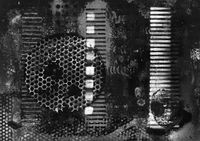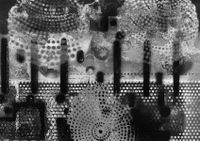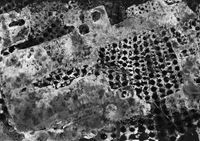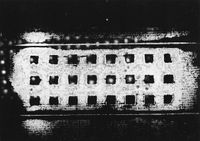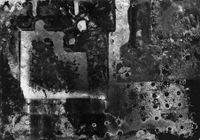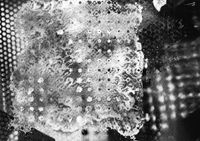ZIZ, 2023, Chromlack s/w auf Karton, je 21 x 14,8 cm
In the years 2021-22, PBK and DSM began to conceptualize a split release on cassette tape with the title, “ZIZ”. With each side acting as a mirror to the other, PBK and DSM skillfully reflect on each other’s audio creations. The parallelism extends beyond the music itself. Both sides bear the same titles, Zeh, blurring the boundaries between the artist’s distinct approaches. Yet, it is not solely the music that fueled the connection between PBK and DSM. Each artist shared a curiosity and admiration for the other’s noisy endeavors, but the realms of literature, social sciences, and the arts enveloped their discussions, infusing their respective creations with newfound depth. Though the music itself manifested as an organic outcome, it was the exploration of these diverse subjects that truly ignited their creative synergy. The dialogue between the artists, as reflected on “ZIZ”, reveals not only the power of this interaction but also the potential that lies within the intersections of these diverse inspirations
Es handelt sich um Ziz, den himmlischen Vogel, der von der mittelalterlichen Exegese geschaffen wurde und zu den Speisen des Festes der Gerechten gehört. Er kommt weder in der Bibel noch in der intertestamentarischen Literatur vor, wird aber häufig in rabbinischen Quellen erwähnt. Sein Name ist durch die kreative Etymologie der Rabbiner mit seiner Nahrungsbestimmung verbunden: Warum wurde er Ziz genannt? Weil er verschiedene Geschmäcker hat: den Geschmack von diesem (Zeh) und den Geschmack von jenem (Zeh)
(Lv. R 2210)
It is ziz the heavenly bird, created by medieval exegesise and featured among the dishes of the feast of the righteous. It is not present in the bible or intertestamentary literature but is often mentioned in rabbinical sources. His name is linked to his food destination by the creative etymology of the rabbis: Why was he called Ziz? Because it has different tastes: the taste of this (zeh) and the taste of that (zeh)
(Lv. R 2210)
Anna Angelini, "Vergleichende taxonomische Methoden : Dan Sperber und Mary Douglas über Tiere außerhalb der Kategorie"."Comparative taxonomic methods: Dan Sperber and Mary Douglas on out-of-category animals".
Guido Hübner - DAS SYNTHETISCHE MISCHGEWEBE
Hinter dem Namen DAS SYNTHETISCHE MISCHGEWEBE verbirgt sich Guido Hübner mit einem wachsenden Kreis von Komplizen. DAS SYNTHETISCHE MISCHGEWEBE ist als Programm zu verstehen. Gegründet wurde die Gruppe bereits im Jahre 1980, jedoch begann die erste länger bestehende Formation aus Rainer Frey, Isabelle Chemin und Guido Hübner ihre Kooperation 1985 in Berlin. 1986 zogen sie nach Barcelona, 1991 nach Bordeaux, der ursprünglichen Heimatstadt von Isabelle Chemin, 1995 nach Caen, Basse-Normandy und in der Zwischenzeit wohnt Guido Hübner in Rennes in der Bretagne.
DAS SYNTHETISCHE MISCHGEWEBE, mit einem Fuß in der bildenden Kunst und der Performance, dem anderen in der Welt des Klanges, sowie einem ausgeprägten wissenschaftlichem Interesse begann in den frühen 80er Jahren in Berlin mit electro-industrial-avangarde Kassettenveröffentlichungen. Die erste LP wurde auf dem einzigartigen Label Discos Esplendor Geometrico in Madrid veröffentlicht. Nach der Veröffentlichung folgten CD's und Vinyl's auf SFCR (F) und Pinch-A-Loaf (USA), Povertech (USA), sowie Kollaborationen, live aber auch für Tonträger mit MSBR, Mnortham, Frans de Waard, Ios Smolders, Artificial Memory Trace, Thomasius, TBC, The Oval Language, The New Blockaders, Alan Curtis, Roel Meelkop und anderen, sowie zahlreiche Compilation-Beiträge. Guido Hübner von DAS SYNTHETISCHE MISCHGEWEBE schrieb auch ein Stück für das "Zeitkratzer Ensemble" und ihren früheren Saxophonisten Ulrich Krieger, erhielt eine Einladung in das Studio für Elektroakustische Musik der Kunstakademie Berlin und schrieb elektro-akustische Kompositionen, die in Berlin, Brügge und Caen aufgeführt wurden und präsentierte verschiedene Installationen in Berlin, Leipzig (Cage100) und in Frankreich (Festival Interstice, Caen), Centre Pompidou, Paris u.w. In den letzten Jahren trat er mehrfach mit seinem Sohn Sacha in Frankreich und Deutschland auf.
PBK - Phillip Klingler
American composer, Phillip B. Klingler, better known as PBK, has been active in the experimental music underground since 1986. His work first became known through the homemade independent cassette culture scene of the 1980s, though later releases have also been in compact disc and LP format. His work has correlations to electroacoustic, classic industrial and free jazz genres. His compositions are created using extreme turntable manipulation, sampling, analog and digital synthesis. Improvising spontaneously and with little preconception, PBK creates pulsing, dense soundscapes of unknown sonic origin.
In the years 1992-1996, PBK lived in Puerto Rico where he began experimenting with record turntables and extreme use of MIDI sequencer programming creating an early form of glitch best exemplified by the cassette album, Listening To The World Vibrate. Several other projects were completed including a 3-LP boxset titled Domineer/Asesino/Retro and a CD release titled Life-Sense Revoked, a collaboration with other artists.
PBK has performed live throughout the U.S. and in Europe. A restless collaborator, he has worked with some of the most respected names in experimental music. A partial list would include such musicians as Asmus Tietchens, Aube, Jarboe (of Swans), Jim O'Rourke, Minóy, Vidna Obmana and Wolf Eyes. Over the course of nearly thirty years, PBK has had over 75 full-length albums released internationally, establishing a complex body of work that reveals a unique approach to the Noise music aesthetic.

